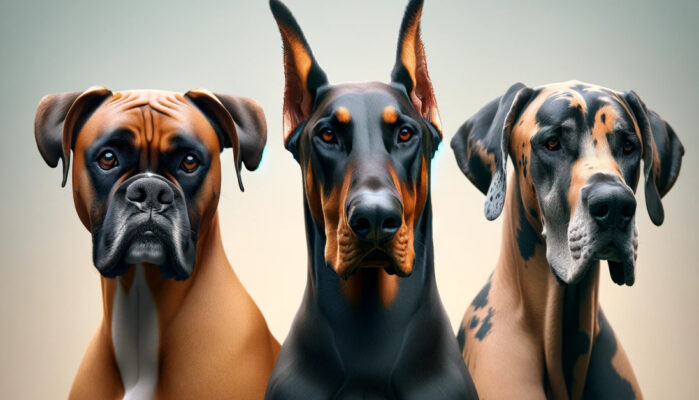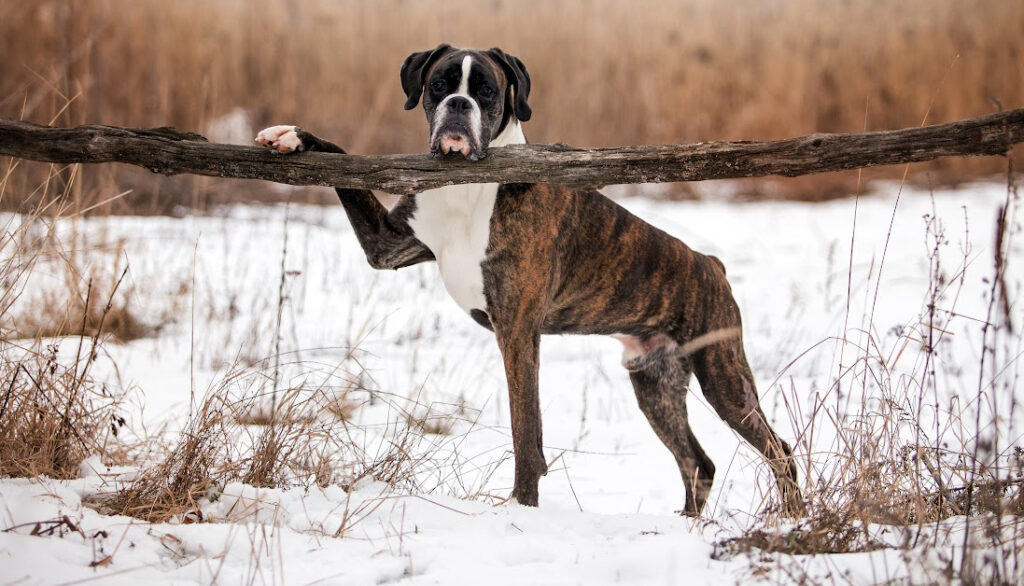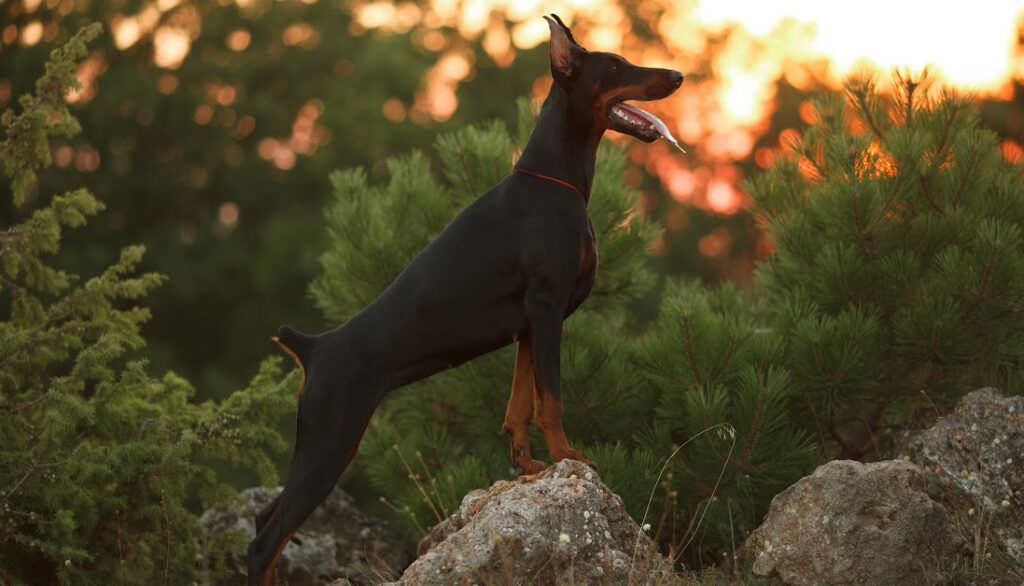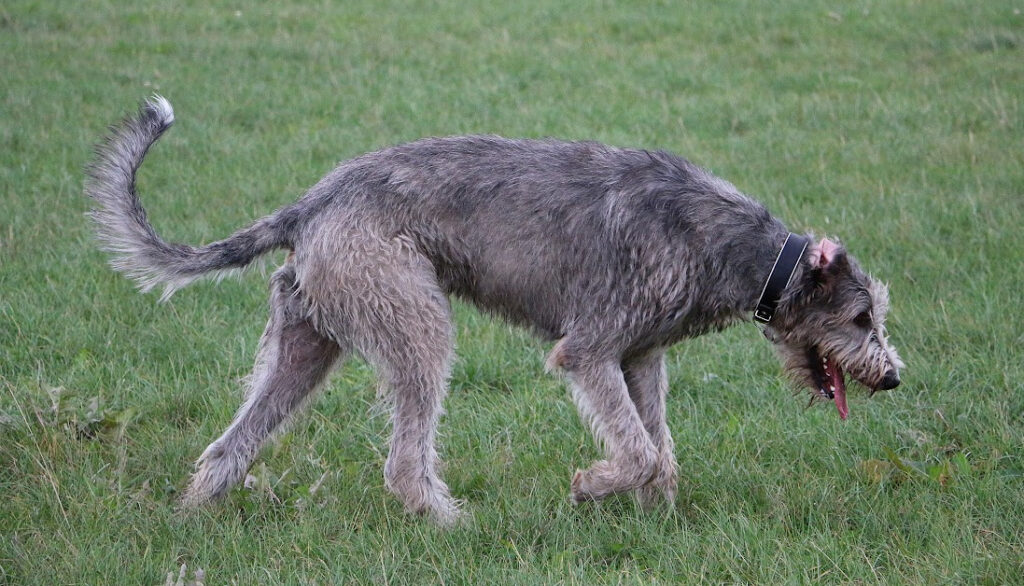Welcome, fellow dog lovers! If you’re here, it means you’re interested in learning about deep chested dog breeds. These canines, with their expansive rib cages and striking appearance, are a sight to behold. But it’s not just about looks; knowing if your dog is a deep-chested breed can be vital for their health and well-being.

So, what exactly are deep chested dog breeds? Simply put, these are dog breeds characterized by a chest that is broader and deeper than other breeds. This distinctive physical trait often gives these dogs a bold and powerful look, but it also comes with its own set of unique behavioral characteristics and potential health risks.
Deep-chested breeds may range from large breeds like the Great Dane and German Shepherd to medium or smaller breeds like the Basset Hound or Dachshund. Regardless of size, these breeds often stand out from the crowd with their wide, expansive chests. But deep chests aren’t just for show. In some breeds, a deep chest can enhance their physical abilities, making them more efficient runners or swimmers.
However, being a parent to a dog from a deep-chested breed also requires awareness of the specific health risks they face, such as a dangerous condition called bloat. This is a medical emergency that affects deep-chested breeds more often than others. It’s essential to know the signs and how to prevent it.
Embarking on a journey with a deep-chested canine is a rewarding experience. Their unique qualities make them endearing pets, and with the right knowledge, you can ensure a happy and healthy life for your beloved pet. Remember, knowledge is power when it comes to caring for your canine companion, especially when they belong to a deep-chested breed.

Characteristics of Deep Chested Dog Breeds
Unlock the mystique that surrounds deep chested dog breeds. Delve into their unique physical and behavioral traits that not only make them stand out in the canine crowd but also endear them to dog lovers worldwide. Equipped with knowledge about these breeds, you will be empowered to provide them with the best care and lifestyle they deserve.
Physical Traits of Broad-Chested Canines
As a holistic veterinarian, I often tell my clients that knowledge is the first step in excellent pet care. When it comes to deep chested dog breeds, understanding their physical traits is vital. These dogs are typically characterized by a chest depth that is significantly greater than the width, giving the chest a “deep” appearance. This trait is often coupled with a narrower waist or abdomen.
The deep chest allows for larger lung capacity, which originally served breeds like hounds and retrievers well in their working days, providing them with the stamina to carry out their tasks. Some common large deep chested breeds include the Great Dane, Doberman, and Irish Wolfhound. Medium to small breeds with deep chests are also quite common and include the Dachshund and Basset Hound.
Behavioral Traits of Deep Chested Dog Breeds
Personality and behavioral traits can vary widely among deep chested dog breeds, largely due to their diverse backgrounds and original breed purposes. Some breeds, such as the German Shepherd and Doberman, are known for their loyalty, intelligence, and protective nature. They are often employed in roles such as guarding, police work, and search and rescue.
On the other hand, breeds like the Basset Hound and Dachshund, despite their smaller size, are known for their tenacity and determination, traits that made them excellent hunters in their early days. These breeds are typically friendly, outgoing, and enjoy being part of the family.
Although these are general characteristics, it is essential to remember that each dog is an individual. The way a dog is raised, socialized, and trained will significantly impact its behavior.
As a dog parent, understanding these traits can help you better cater to your dog’s needs, thus ensuring its overall well-being. For instance, a deep chested breed known for its stamina and agility would require ample exercise and mental stimulation to prevent behavioral issues.
By understanding the characteristics of deep chested dog breeds, you are well on your way to providing the best care and environment for your four-legged friend. The joy and fulfillment of caring for these breeds go beyond their physical charm, extending to the love, loyalty, and companionship they bring into your life.
List of Specific Deep Chested Dog Breeds
When we talk about deep chested dog breeds, we’re referring to a group that exhibits a significant depth in the chest area, from the backbone to the abdomen. This feature is common among several dog breeds, both large and small. Let’s take a deeper look at some of these breeds.
Large Deep Chested Dog Breeds
To start off, there are several large dog breeds that are classified as deep chested. These breeds often exhibit powerful statures and athletic abilities, alongside their distinctive chest structure.
- – Great Dane: Known as the “Apollo of Dogs,” Great Danes are among the tallest breeds and have deep, broad chests. Their large size and imposing stature are complemented by a gentle and affectionate nature.
- – Boxer: Boxers are muscular and agile dogs with deep chests and strong bodies. They are renowned for their playful, energetic, and friendly behaviors.
- – Doberman Pinscher: This breed is known for its loyalty and intelligence. They have a lean, muscular build with a deep chest that contributes to their agility and speed.
- – Irish Wolfhound: Originally bred for hunting wolves, Irish Wolfhounds are one of the tallest breeds. Their deep chests accommodate large lungs, correlating with their historic endurance in the field.
Medium to Small Deep Chested Dog Breeds
Don’t make the mistake of thinking that only large breeds can have deep chests. There are several medium to small breeds that also feature this distinctive trait.
- – Basset Hound: Basset Hounds are easy to recognize with their droopy ears, sad eyes, and notably, deep chests. Despite their relatively small size, they were bred for endurance on the hunt and their deep chests accommodate this.
- – Pekingese: While small, Pekingese have a broad, deep chest relative to their size. This breed is known for their courage and self-importance, which is often amusingly contrasted with their petite stature.
- – Dachshund: Often referred to as “wiener dogs” due to their long bodies, Dachshunds have a deep chest that provides lung capacity for stamina when hunting.
- – Shih Tzu: Although small, Shih Tzus have a sturdy build and a deep chest. They are known for their friendly and affectionate nature, which makes them excellent companion dogs.
Understanding that your dog is a deep chested breed is the first step towards providing the appropriate care they need. Whether they are large, like a Great Dane, or small like a Shih Tzu, these dogs share a common trait that may require special attention. In the following sections, we’ll delve into health risks associated with deep chested breeds and how to care for them. But for now, take pride in knowing a little more about your deep-chested friend, their unique physiology, and the long history that shaped them into the breeds we know and love today.
Health Risks Associated with Deep Chested Dog Breeds
When it comes to deep chested dog breeds, there are certain health risks that you need to be aware of. As a dog parent, your main focus should always be the wellbeing of your furry friend.
Common Health Issues in Broad-Chested Canines
Broad-chested canines have unique physical structures that can predispose them to certain health issues. While these dogs are truly magnificent and full of personality, their deep chests may lead to various health problems. Here are some common health risks:
- Cardiovascular issues: Deep chested dog breeds often have a larger heart compared to other dogs. This may lead to various heart conditions.
- Respiratory problems: Their unique physique can sometimes lead to breathing difficulties and respiratory disorders.
- Spinal issues: Dogs with deep chests can have a higher risk of suffering from spinal problems due to their long backbone.
- Orthopedic problems: Many deep-chested breeds are also large breeds, which can predispose them to conditions like hip dysplasia or other joint issues.
These health risks may sound daunting, but with proper care, regular check-ups, and a healthy lifestyle, your dog can lead a fulfilling life.
Understanding Bloat in Deep Chested Dog Breeds
The most serious health concern for deep chested dog breeds is a condition known as Gastric Dilatation-Volvulus (GDV), commonly referred to as “bloat.” Bloat is a medical emergency that can be fatal if not treated promptly.
In GDV, the dog’s stomach fills with gas and can twist on itself (volvulus), causing severe pain and leading to shock, organ damage, and death if not quickly addressed. Symptoms include visible distension of the abdomen, restlessness, drooling, retching without producing vomit, and signs of pain.
Deep chested breeds, such as Great Danes, St. Bernards, and Weimaraners, are at a higher risk of bloat due to the shape and size of their chest cavity, which provides more space for the stomach to potentially twist.
If you notice any signs of bloat in your dog, it is crucial to seek immediate veterinary attention. Remember, prevention is always better than cure. Therefore, try to learn about the steps you can take to prevent bloat in your deep-chested companion, such as smaller, more frequent meals, avoiding vigorous exercise after eating, and discouraging rapid eating.
Remember, each breed is unique and may not necessarily develop these health conditions. But staying informed about potential risks can help you ensure that your deep chested dog breed lives a long, happy, and healthy life.

Diet and Nutrition for Broad-Chested Canines
Proper diet and nutrition play a crucial role in maintaining the health of deep chested dog breeds. A balanced diet is vital to ensure your canine friend gets all the essential vitamins, minerals, and nutrients they need.
- Protein should be the main component of your dog’s diet. It helps build strong muscles and maintain a healthy coat. Choose dog foods that list a high-quality source of protein, like chicken, beef, or fish, as the first ingredient.
- Fats are also necessary for your dog, but in moderation. They provide energy and help absorb vitamins. Look for dog foods with healthy fats like omega-3 and omega-6 fatty acids.
- Carbohydrates provide energy and are important for digestion. However, deep chested dog breeds are prone to bloat, a condition that can be exacerbated by consuming large amounts of carbs. Therefore, opt for dog foods with complex carbs like sweet potatoes and brown rice, and avoid those with simple sugars.
- Fiber is essential for healthy digestion. It helps prevent constipation and maintains a healthy weight.
- Vitamins and minerals are vital for various bodily functions. They support the immune system, maintain healthy skin and coat, and promote bone health.
Remember, every dog is unique, and their nutritional needs may vary based on their age, size, breed, and activity level. It’s always best to consult with your vet before making any significant changes to your dog’s diet.
Exercise and Training for Deep Chested Dog Breeds
Deep chested dog breeds are generally active and require regular exercise to stay fit and healthy. However, due to their susceptibility to bloat, certain precautions should be taken.
- Avoid vigorous exercise immediately after meals. This can cause the stomach to twist, leading to bloat. Instead, wait for at least an hour after feeding before engaging your dog in any strenuous activities.
- Regular, moderate exercise is better than infrequent, intense workouts. Long walks, gentle hikes, or play sessions in the backyard are excellent ways to keep your dog active without overexerting them.
- Training is also an essential part of caring for deep chested dog breeds. These dogs are often intelligent and eager to please, making them relatively easy to train. Use positive reinforcement methods, like treats and praise, to encourage good behavior.
- Socialization is crucial for deep chested dog breeds. Expose them to different people, environments, and other animals from a young age to ensure they grow up to be well-rounded dogs.
- Mental stimulation is just as important as physical exercise for these breeds. Provide them with puzzle toys, teach them new tricks, or engage them in dog sports like agility or obedience trials.
In conclusion, caring for deep chested dog breeds involves a balanced diet, regular exercise, and proper training. Always remember to consult with your vet for personalized advice based on your dog’s specific needs. Owning a deep chested dog breed can be a joy and a responsibility, but with the right care, these dogs can make wonderful companions.
Preventive Measures for Health Risks in Deep Chested Dog Breeds
Preventing Bloat in Broad-Chested Canines
The health of deep chested dog breeds is of primary importance if you’re a responsible dog parent. One of the most significant health risks is Gastric Dilatation-Volvulus (GDV), commonly known as bloat. This condition is life-threatening and requires immediate medical attention. Therefore, prevention is the best approach.
Here are some tips to help prevent the occurrence of bloat in your broad-chested canine:
- Feed your dog multiple small meals throughout the day instead of one large meal. This can help to slow down their eating, reducing the amount of air they swallow.
- Use a dog bowl designed to slow down eating. Some dog bowls have ridges or other obstructions that encourage slower eating.
- Do not exercise your dog immediately after meals. It’s advisable to wait for about an hour or two after feeding before engaging them in strenuous activities.
- Keep your dog hydrated. A hydrated dog is less likely to gulp down large amounts of air.
Regular Vet Check-ups for Deep Chested Dog Breeds
Vet check-ups are essential for all breeds, but they’re even more vital for deep chested dog breeds due to their increased risk of health issues. Regular vet visits can help identify potential health risks before they become severe.
Here are some reasons why regular vet check-ups are important:
- Early detection: Regular vet visits can help identify any potential health risks early. Conditions like GDV often have subtle symptoms that might be missed by untrained eyes.
- Dietary advice: Vets can provide personalized advice about your dog’s diet and nutrition, which can help prevent health issues associated with deep chests like obesity and bloat.
- Regular vaccinations: Vaccinations are crucial for maintaining your dog’s health, and regular vet visits ensure that your dog’s vaccinations are up to date.
- Health monitoring: Regular check-ups allow the vet to monitor your dog’s overall health and track any changes over time.
In conclusion, preventive measures are crucial in maintaining the health of deep chested dog breeds. As a dog parent, it’s your responsibility to ensure that your pup leads a healthy and happy life. By taking these precautions, you can help prevent serious health issues and ensure that your furry friend stays in the best of health. Remember, prevention is always better than cure.

Adopting a Deep Chested Dog Breed: Things to Consider
Choosing the Right Deep Chested Dog Breed for Your Lifestyle
When it comes to adopting a deep chested dog breed, it’s crucial to consider your lifestyle. As dog lovers, we all dream of adopting a canine companion that fits our unique lifestyles. However, not all breeds are suitable for every living environment or activity level.
If you lead an active lifestyle and enjoy outdoor activities, breeds like Greyhounds, Weimaraners, or Labradors could be an excellent fit. These breeds are energetic, love exercise and they thrive in active homes. However, they are also prone to health issues like bloat due to their deep chests, so regular vet check-ups and proper care are essential.
On the other hand, if you prefer a more relaxed lifestyle, deep chested dog breeds such as the Basset Hound or the Dachshund could be more suitable. These breeds are generally more laid back and require less strenuous exercise. That being said, they still require a healthy diet and suitable preventive measures to avoid health risks related to their broad chests.
Preparing Your Home for a Broad-Chested Canine
Once you’ve decided on the right deep chested dog breed for your lifestyle, it’s time to prepare your home. Remember, these breeds are unique and need a bit more attention and care due to their unique physical traits.
Firstly, ensure your home is safe and comfortable for your four-legged friend. Remove items that could harm them or lead to accidents. For example, small toys or objects can become a choking hazard.
Another consideration is their feeding area. Since deep chested dog breeds are prone to bloat, it’s recommended to use a raised feeding bowl to help them eat more slowly and digest their food better.
Exercise is also crucial for these breeds, so it’s essential to have a space where they can freely move and play. If you don’t have a big yard, daily walks or trips to the local dog park can help them stay fit and healthy.
Lastly, make sure to have the contact information of a reliable vet who is familiar with deep chested dog breeds. Regular check-ups are a must to ensure your dog remains healthy and any potential health issues are detected early.
When it comes to adopting a deep chested dog breed, understanding the breed, your lifestyle, and preparing your home are essential steps. These breeds are incredible companions, filled with personality and love. With the right knowledge and care, you can ensure a happy and healthy life for your broad-chested canine!
Deep Chested Dog Breeds: The Joy and Responsibility
As we wrap up, it’s essential to remember that while owning a deep chested dog breed brings joy and companionship, it also comes with a significant amount of responsibility. These unique canines with their broad chests and endearing personalities are a sight to behold, but they require a little more attention and care than other breeds.
Recap of Identifying and Caring for Deep Chested Dog Breeds
We’ve explored the world of deep chested dog breeds, providing you with a comprehensive guide on how to identify them based on their physical and behavioral traits. We also listed some of the common breeds, both large and small, to help you recognize them easier.
We’ve delved into the health risks typically associated with these breeds, specifically focusing on the dreaded condition known as bloat. Understanding these risks and knowing how to spot the signs of bloat can potentially save your dog’s life.
Providing proper care for your deep chested dog breed is crucial. A balanced diet and a regular exercise regimen are vital to their health and well-being. Preventative measures, such as smaller, more frequent meals and avoiding vigorous activity around meal times, can help reduce the risk of bloat. Regular vet check-ups are also crucial in ensuring your dog stays healthy and catches any potential health issues early.
Emphasizing the Unique Qualities of Broad-Chested Canines
Deep chested breeds are not just unique in their physical appearance; they also possess certain qualities that make them truly special. Their robust stature often comes with a heart equally as big. Many of these breeds are known for their loyal and protective nature, and their deep chests often house a lot of love for their human companions.
Whether it’s a large breed like the Great Dane, known for being gentle giants, or a smaller breed like the Dachshund, famous for their bold and brave personalities, each deep chested breed brings its unique charm into your life.
Adopting a broad-chested canine should not be taken lightly, as it requires thoughtful consideration. Choosing the right breed that suits your lifestyle and preparing your home are crucial steps in ensuring a happy and stress-free life for both you and your new furry friend.
In the end, the joy of seeing your loyal deep chested dog breed thriving and their tail wagging in happiness makes all the efforts worthwhile. Despite the potential health risks and the extra care required, the love and companionship that these breeds offer are truly incomparable.
So, here’s to the broad-chested canines that enrich our lives with their loyalty, love, and larger-than-life personalities. Remember, being a responsible pet parent to a deep chested dog breed isn’t a challenge; it’s a journey that brings endless joy, laughter, and unforgettable memories.
Frequently Asked Questions
Q1: What are deep chested dog breeds?
A: Deep chested dog breeds are those that have a chest depth which is significantly larger than the rest of their body. This includes breeds such as the Great Dane, Doberman, and Boxer.
Q2: Why is it important to identify if my dog is a deep chested breed?
A: Deep chested breeds are more prone to certain health issues, such as bloat or gastric dilatation-volvulus (GDV). Knowing if your dog is a deep chested breed can help you take preventative measures.
Q3: How can I care for my deep chested dog?
A: Regular vet check-ups, a healthy diet, and monitoring for signs of bloat are all important aspects of caring for a deep chested dog. It’s also recommended to avoid vigorous exercise right after meals.
Q4: What are the signs of bloat in deep chested dogs?
A: Signs of bloat can include a swollen or hard abdomen, excessive drooling, restlessness, rapid heartbeat, and signs of discomfort or pain. If you notice these symptoms, seek veterinary help immediately.
Q5: Can other dog breeds get bloat?
A: Yes, while deep chested breeds are more prone to bloat, any dog can potentially suffer from this condition. It’s important to be aware of the signs regardless of your dog’s breed.
Dr. Candy, a holistic veterinarian and certified raw dog food nutrition specialist, graduated from Oklahoma State University in 2009 with a DVM and has since specialized in companion animal nutrition, advocating for species-specific diets. With a background in wildlife rehabilitation and oil spill response, she combines holistic health and conventional medicine in her unique approach to treating chronic diseases, allergies, and autoimmune conditions in pets. As the owner of a veterinary practice in Colorado and an author, Dr. Candy is dedicated to educating pet parents and improving the health and happiness of animals.




